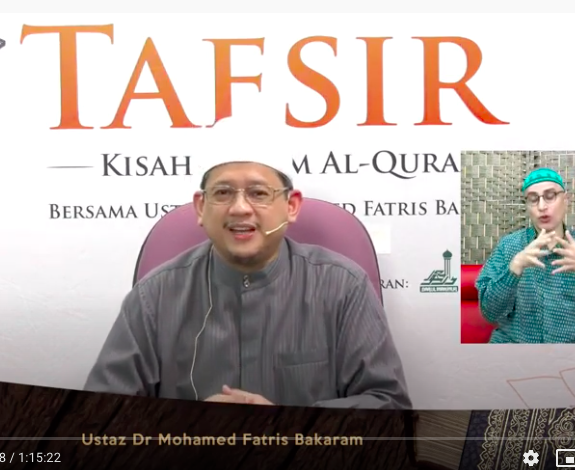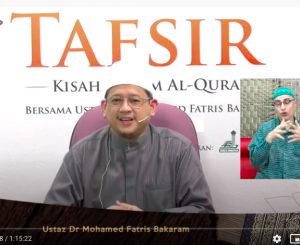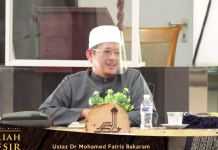This article is a summary of takeaways from Ustaz Dr Mohamed Fatris Bakaram’s Tafsir Online Lecture on 9th August 2020. Summaries of previous lectures on Surah Maryam and Surah Taha and Surah Al-Ambiya’ can be found here. This lecture is a continuation of the previous lecture on Surah Al-Hajj.
Questions from the Previous Lecture
Posting Selfies with the Kaaba
Q: What is your opinion of taking selfies with the Kaaba with the intention of sharing it with people, so that they may also want to come to Makkah for Hajj or Umrah?
A: Before I respond, it is important that we look at which parties are involved in this question; is the act of taking selfies being done by you or by other people?
Other People Taking Selfies
When it comes to other people, whenever we see photos posted on Facebook or Instagram of their people performing Hajj or Umrah, my advice is to practice Husnuzhon or ‘thinking well of others’. We do not know their true intentions; whether what they say is sincerely what is in their hearts is unknown to us.
This is something that remains a secret between the doer and Allah SWT. It is not our right to know it or to ask about it. We cannot find evidence to support our claims that they may be doing it to show off, instead of wanting to encourage others to do Umrah.
If we hold a negative opinion of their intentions, then it is best that we do not mention it to anyone. If we say something against them, and it ends up being false, then it means that we are spreading falsehood or slander; this is a major sin. At the very least, it will cause hurt on the person being slandered. We avoid judging people’s intentions at all costs.
Instead, make du’a for them. Ask Allah SWT to bless them and reward them if indeed their intentions are pure. If indeed they are posting on social media in the hopes of encouraging others to perform Hajj and Umrah, then we ask that Allah SWT opens up the hearts of the audience seeing the photos to plant in their own hearts the desire to visit the Holy Land.
Whatever you see anyone else doing, do not hold a negative opinion of them. And if you do not think well of them, then ensure that you do not let slip your negative thoughts by sharing your opinion with others. Instead, make du’a for them in hopes that Allah SWT will protect their hearts just as we would like Him SWT to protect our own hearts.
Us Taking Selfies
When it comes to us, should we do selfies with the same intention? Now, when looking at yourselves, the first most important thing to do is to check your intentions. Is it true that you are sharing so that others may be encouraged to do Hajj/Umrah? Are you confident that you do not have any other intentions? If so, then we pray that Allah SWT accepts your good intention.
Whenever someone does good, and someone else follows in his footsteps to do the same good, then the first person gets the rewards for the second person doing good. The person being emulated gets the reward of both deeds being done because he was the trigger to the deed.
Please remember that in this hadith, the same thing applies for evil deeds. If a sin is being done, and someone else follows after watching the initial act being done, then the first person to do the sin also gets the sin similar to that of the second person who does it.
If you catch yourself seeing that your intentions are to boast, show off, or to prove people wrong, then I suggest that you stop yourself from sharing the photos. Sharing the photos with the wrong intentions could become something forbidden in the religion. We fear that the Hajj may not be accepted, and its rewards wasted because of this act of boasting.
The second thing to note is to do a cost-benefit analysis to see if the outcomes we get will sufficiently meet our intentions. Sometimes, we may have good intentions, but we need to understand there are other factors and elements in play. We need to see whether our primary intention will be achieved through our actions.
For example, we can say, “I want to share this photo so that my siblings, who are distanced from the religion and don’t even pray, may feel encouraged to want to go for Umrah themselves.”. Think about the character of your siblings. Are they the type of people who will get inspired by good things if they were to be presented with photos like these?
If you know that they are the type of people who get turned away from the religion, the more you try to bring them closer, then do you really think that it is a good idea to share these photos with them? The intentions need to be sincere for Allah. We also need to evaluate if our end goals are highly likely to be achieved or if they are not feasible to achieve.
We also need to consider our own character. Today, our intentions may be sincere for Allah SWT. Tomorrow, they may shift. There are some people who are able to maintain their sincerity in their intentions even as they continue to do good deeds that are seen by others. Others, struggle with intentions that ebb and flow; they are prone to feeling pride and view highly of themselves when their deeds are praised by others.
If you know that you belong to the latter group, then it is best for you to avoid sharing these selfies, even if your present intentions are good. You do not want to give the opportunity for the internal whispers to bring you towards Riya’ and destroy your deeds.
We fear that it may not be the visible flames of sin that are burning away the wood immediately, but rather the silent hidden termites that are slowly eating away the wood internally, such that one day you might find that the wood just collapses without you knowing it.
I am personally inclined to not share my Ibadah on social media. For me, they are personal and I do not want to be showing them to others.
Tafsir References used in these Lectures
Q: Which Tafsir books have been used as references for this Tafsir Lecture?
A: If you are asking regarding which tafsir texts the audience is referring to, then I would like to say that from the start, we have not specified or restricted which translation or tafsir texts should be referred to, or which language or platform should be used. Everyone is free to refer to any texts they have access to.
If you are asking regarding my references for this tafsir class, then this is my answer. There are two stages of references that I use.
Foundational References
The first is the foundation, that allows me to understand the verses of the Qur’an in a general manner. There are three books that I use often:
(1) Tafsir Al-Munir by Sheikh Wahbah Az-Zuhaili
(2) Al-Wasit fi Tafsir by Sheikh Muhammad Sayyid Tantawi
(3) Tafsir Al-Azhar by Professor Hamka
These are three basic references that are used as a foundation because they are sufficient for anyone who seeks to understand the Qur’an.
Supporting References
When it comes to verses that have deeper issues that need to be addressed, when more extensive reading is required, I use the following three books:
(1) Mafatih al-Ghaib by Imam Fakhruddin Ar-Razi
This book has very extensive and comprehensive discussions on various issues related to each verse. Sometimes, even a short verse can have over 20 issues being discussed regarding it. This is the reference I use for deeper elaborations of the verses covered.
(2) Tafsir Al-Qur’an Al-Azim by Imam Ibn Kathir
This book is beneficial because it discusses many stories of the past. It is a Tafsir that is filled with Hadith of the Prophet SAW. This is particularly important for when I want to find the Asbabul Nuzul (i.e. the incidents behind the revelation of certain verses), or if I want to find the stories of the past prophets.
(3) Al-Jami’ li Ahkam al-Quran by Imam Al-Qurtubi
This book has incredibly detailed discussions, especially on the topics of Fiqh rulings. I refer to this when it comes to verses that touch upon Fiqh matters.
References for Last Week’s Lecture
If you are specifically asking regarding the references used for last week’s lecture, 80% of the lecture had been on the topic of “Business during Hajj”. Business being one of the benefits of Hajj is something that is mentioned in almost all the Tafsir books. All of these texts refer to the verse in Surah Al-Baqarah as their supporting evidence.
Regarding the du’a we mentioned, this was specifically mentioned in Tafsir Al-Azhar by Professor Hamka. I hope this answers your questions, we will now move on to today’s lecture.
Surah Al-Hajj continued
We previously stopped at the verse where the people who go for Hajj are asked to slaughter their animals during the specified days (Tashrik days). They are then instructed by Allah to eat and share the meat with others. The surah then continued with the following rituals of Hajj.
The Tahallul
ثُمَّ لْيَقْضُوا تَفَثَهُمْ
Then, they must remove their dirtiness… [22:29]
In this verse, when Allah says that they must “remove their dirtiness”, He SWT is permitting the Tahallul to be performed and the Ihram to be terminated.
When someone is in the state of Ihram, there are certain acts that become Haram (forbidden) for them; they cannot apply fragrances, hunt, cut their hair and nails, or have sexual intercourse. The act that makes these forbidden acts in Ihram Halal again is called the ‘Tahallul’.
Once the Wuquf at Arafah is complete, the pilgrims head to Mina, passing by Muzdalifah. On the 10th of Zhulhijjah, they will celebrate Eid al-Adha by performing Tahallul after throwing Jamrah ‘Aqabah.
Cleansing themselves by ‘removing dirtiness’ here means that the pilgrims are now allowed to shower, apply perfume, use perfumed soaps, and trim their nails and hair. This is such a relief especially for people who do Hajj Ifrad, where they enter the state of Ihram the moment they arrive in Makkah. If they had arrived in Makkah two weeks before Hajj, then their Ihram begins then and there.
At the moment of Tahallul, all that had been made Haram is immediately made Halal except for one thing – sexual intercourse between husband and wife. Only after the return of the Pilgrims to Masjidil Haram for the completion of Tawaf Ifadhah (the Tawaf of Hajj) and Sa’ie, only then will the bigger Tahallul be done and the Hajj is finally complete. Only then will all that had been Haram be made Halal once more. The one performed after Jamrah ‘Aqabah is considered the small Tahallul.
Why does Allah SWT allow the Tahallul to be done before the Tawaf? Do not confuse the Tahallul done in Umrah with the Tahallul done in Hajj. In Umrah, the Tahallul is done after the Sa’ie has been completed. In Hajj, the Tahallul Asghar (the small Tahallul) is performed before the Hajj Tawaf. And the final Tahallul is done after the Sa’ie of Hajj.
The Ancient House
وَلْيُوفُوا نُذُورَهُمْ وَلْيَطَّوَّفُوا بِالْبَيْتِ الْعَتِيقِ
… and fulfil their vows and make Tawaf of the Baitil ‘Atiiq… [22:29]
Many people perform Nazar when they perform Hajj, asking Allah SWT to ease their affairs and protect them during this period. Allah SWT tells them to fulfil their vows at this point of time. If they said they had given their word that they would slaughter two cows should their Hajj be facilitated, then they need to slaughter two cows at this moment.
And then they are asked to make Tawaf of the ‘Baitil ‘Atiiq’. This can be translated to “the ancient house”, a phrase used by Professor Hamka in his text. The word ‘Atiiq refers to something old, an antique, an ancient item. The Kaaba is indeed an old house, built centuries before by Prophet Ibrahim AS.
Another meaning of the word ‘Atiiq is “free”. The Kaaba is referred to as a ‘freed building’. This gives two meanings, the first is that the Kaaba has never been owned by anyone. Throughout history, there has never been a single person who claimed ownership of the House of Allah. The sole owner of the house is Allah SWT.
The second meaning is that this house has never been overpowered or colonised by any ruler or authority. We know that in the year that Prophet Muhammad SAW was born, there had been King Abraha who had come with his army and troop of elephants to destroy the Kaaba. We know that incident ended with failure on the attackers’ side as Allah SWT protected Al-Kaaba Himself SWT. And so the Kaaba remained free.
Hurumaat of Allah
ذَٰلِكَ وَمَن يُعَظِّمْ حُرُمَاتِ اللَّهِ فَهُوَ خَيْرٌ لَّهُ عِندَ رَبِّهِ ۗ
… That is so. And whoever honours the Hurumaat of Allah, it is best for them in the sight of their Lord… [22:30]
What are the Hurumaat of Allah? They are the thing that Allah SWT honours that become forbidden for us to destroy or tarnish.
Now if you remember, we previously mentioned “Shahrul Haram” (the Haram months) and “Masjidil Haram” (the Haram mosque). What does it mean by Haram? Is it the opposite of Halal (permissible)?
No, in this case, Haram means honourable. So we refer to the three months as ‘Honoured months’, the mosque which holds the Kaaba as the ‘honoured mosque’, and the country that holds the Kaaba (Makkah) as the ‘honoured country’, “Al-Baladil Haram”. Muzdalifah is known as “Al-Mash’aril Haram”, the honoured land. The Kaaba is sometimes referred to as “Baitullah Al-Haram” or “Baitil Haram”, the Honoured House of Allah.
Whoever who honours what has been honoured by Allah, then that is best for them in the sight of Allah SWT. We are not asked to just go with the flow and carry out the rituals as we go along. Instead, pilgrims are asked to really feel the honour that is given to these places. To honour what is honoured by Allah SWT.
The Ihram, for example, is an honoured clothing. We need to respect the rules of Ihram to honour it. The Wuquf at Arafah is an honoured ritual; pilgrims are asked to spend that time in worship, making lots of Istighfar, du’a, Taubah, prayers etc. This is the way to honour the honoured land of Arafah and the honoured act of Wuquf.
Meat that is Lawful for Us
وَأُحِلَّتْ لَكُمُ الْأَنْعَامُ إِلَّا مَا يُتْلَىٰ عَلَيْكُمْ ۖ
… The (meat of) cattle has been made lawful for you, except what has (already) been recited to you… [22:30]
What is permitted for sacrifice are only certain animals: cows, camels, sheep, and goats. The meat of these cattle is permissible for consumption, be it during Hajj or during Eid at out own countries, or anytime throughout the year. We cannot say that since these animals were specially selected for sacrifice, they should not be consumed throughout the year. No, this is false. The meat of these animals is made Halal for consumption except in four cases. As stated in Surah Al-Ma’idah, verse 3:
حُرِّمَتْ عَلَيْكُمُ الْمَيْتَةُ وَالدَّمُ وَلَحْمُ الْخِنزِيرِ وَمَا أُهِلَّ لِغَيْرِ اللَّهِ بِهِ وَالْمُنْخَنِقَةُ وَالْمَوْقُوذَةُ وَالْمُتَرَدِّيَةُ وَالنَّطِيحَةُ وَمَا أَكَلَ السَّبُعُ إِلَّا مَا ذَكَّيْتُمْ وَمَا ذُبِحَ عَلَى النُّصُبِ وَأَن تَسْتَقْسِمُوا بِالْأَزْلَامِ ۚ
Forbidden to you are carrion, blood, and swine; what is slaughtered in the name of any other than Allah; what is killed by strangling, beating, a fall, or by being gored to death; what is partly eaten by a predator unless you slaughter it; and that which has been slaughtered before the idols, and that you determine shares through the arrows… [5:3]
We cannot eat the carcasses of animals – animals that are already dead before you slaughter them. What is meant by carcass are animals which had been killed by being strangled (whether intentionally or accidentally), being beaten to death, having fallen to their death, having been horned or gored with horns of another animal to death, or being bitten or eaten by another animal.
Blood is forbidden for consumption. The animal’s flesh and organs are permissible for consumption, but the blood is to be discarded. There are people who collect the blood of animals to cook or eat. This is not permissible for Muslims. In fact, after a slaughter, we are to ensure that the blood drains out of the animal completely before the meat is taken– apart from the blood that is found on the meat itself.
There are people who claim that any meat which has even a bit of blood on it is filth and inedible, that even sushi which is raw and red is Haram. This is false. We are not expected to squeeze out every drop of redness from the meat we consume.
In Islam, there are situations where there are different evidences which make a ruling even more detailed. Surah Al-Hajj verse 30 tells us that all cattle meat is permissible for us. Surah Al-Ma’idah verse 3 tells us several specifications to that meat. Carcasses cannot be eaten; only slaughtered meat is permissible.
Meat of slaughtered animals can be eaten, but the blood is forbidden. Blood is forbidden, but only that which is flowing; blood that is found within the meat is extremely difficult to be removed, it is permissible for us. Islam is easy. What makes it difficult is when we use our incomplete knowledge to make decisions.
Continuing with the verse, swine is forbidden to be eaten, even if it may have been raised as livestock and slaughtered. And lastly, animals which are slaughtered for worship other than to Allah SWT. Some people sacrifice animals for their idols and other religious rituals not linked to Islam.
Even if they say their Basmalah, use a sharp knife and follow the proper steps of halal Muslim sacrifice, for as long as the intention of the slaughter is for other than Allah SWT, then the animal becomes Haram for consumption. Anything besides what has been laid out here is permissible to eat.
Distance Yourselves from Impurity of Faith and of the Tongue
فَاجْتَنِبُوا الرِّجْسَ مِنَ الْأَوْثَانِ وَاجْتَنِبُوا قَوْلَ الزُّورِ
… So distance yourselves from the impurity of idolatry, and distance yourselves from words of falsehood. [22:30]
Allah SWT tells the pilgrims here to eliminate any remnants of idolatry from themselves. And to distance themselves from speech that is false, tainted, and brings about sins. As pilgrims, they have been trained by Allah SWT throughout Hajj to only say what is good. The Talbiyah is repeated over and over again. The rituals of Tawaf, Sa’ie and Wuquf are filled with remembrance of Allah SWT, with Zikr, Istighfar, Tasbih, and Takbir.
Once Hajj has been completed, do not return to your old habits of having an “untamed tongue”. Do not fall so easily amongst the people who enjoy speaking about, criticising, mocking and backbiting others. All our actions after Hajj are important to manage. But the tongue is the most difficult to control and manage. Once the tongue goes out of control, it will be challenging to manage all other actions.
Hajj is not something that is separate form daily life. We cannot say that only during Hajj, that we are a good person who does good, and then return home being the same as before. Bring the training received from Hajj back home, come home a transformed person. Come home deeply impacted by your Hajj, in hopes that your Hajj may be accepted by Allah SWT.
Those who are not Hunafaa’ Lillah
حُنَفَاءَ لِلَّهِ غَيْرَ مُشْرِكِينَ بِهِ ۚ وَمَن يُشْرِكْ بِاللَّهِ فَكَأَنَّمَا خَرَّ مِنَ السَّمَاءِ فَتَخْطَفُهُ الطَّيْرُ أَوْ تَهْوِي بِهِ الرِّيحُ فِي مَكَانٍ سَحِيقٍ
Be upright (in devotion) to Allah, associating none with Him (in worship). For whoever associates (others) with Allah is like someone who has fallen from the sky and is either snatched away by birds or swept by the wind to a remote place. [22:31]
Perform all of your Hajj rituals in a state of being “Hunafaa’ lillah”, being straight and upright, free from corruption in every way of any worship that is inappropriate.
Someone who worships other than Allah is like someone who has fallen from the sky. Iman from Allah SWT is something that is exalted and high up, so anyone who chooses to leave it loses the high status and position in Allah SWT’s eyes.
This is already enough of a tragedy, but Allah SWT adds that not only has this person fallen, he is also attacked by birds in the sky. When we speak about birds high up in the sky, we are not speaking of sparrows and pigeons; we are referring to Birds of Prey.
Wild, vicious animals such as eagles, hawks, and vultures. Someone who falls from the skies without a parachute has an almost certain death. What more if the person is attacked mid-fall by a Bird of Prey, an expert in hunting, with razor-sharp claws designed for shredding flesh?
Tafsir scholars, including Imam Fakhruddin Ar-Razi have said, that this metaphor is a symbol for someone who is swept away by their own desires. When we choose to leave Allah SWT, to leave an honoured place to fall to a disdainful status, our desires will come to welcome us.
We will not be pleased to meet them, for they will shred our body, flesh, mind, and heart into pieces, like a Bird of Prey would. We would become victims to our own desires. May Allah SWT protect us from being amongst them.
Alternatively, the person could also be blown far away by strong winds to distant lands, far away from civilisation. Someone whose body is found near his home would have loved ones attending to his body, his corpse would be taken care of and his funeral rites will be carried out. Someone who is thrown into some remote place will not receive any of this. Subhan Allah, what an imagery that Allah SWT has used!
Those who do not fall into the trap of their worldly desires will instead be blown away by Shaitan, our ultimate enemy. He will gladly welcome you as his friend, in a place that is far distanced from Paradise, a land called Jahannam – the hellfire.
This land is so distant that nobody will be able to save you, especially not the people in Paradise. May Allah SWT protect us from being amongst them.
May Allah SWT guide us in our internalisation and application of what has been taught today. May we be able to purify our hearts and bring ourselves closer to Him SWT. May we meet again in the coming lectures.
Ameen. I love you all for the sake of Allah SWT.
——————–
Summary by: Arina Adom
Arina Adom is a lover of learning who takes on the world with an open mind. Resourceful and adaptable, always ready to take on new challenges. Comfortable working with diverse groups of people, yet able to work independently. Thrives under pressure. Currently seeking a meaningful career that enables her to impact lives directly and bring about positive changes in the lives of others in the community.
Arina graduated with a degree in Science ( Hons ), Life Science from NUS. She is currently taking a diploma in Quran and Sunnah Studies from Al Zuhri.
Watch Kuliah Tafsir again at
Masjid Darul Makmur’s Youtube
Watch and follow Kuliah Tafsir weekly
every Sunday after solat Maghrib
organised by Masjid Darul Makmur
Your contributions are appreciated. Get more details by clicking the image below.












